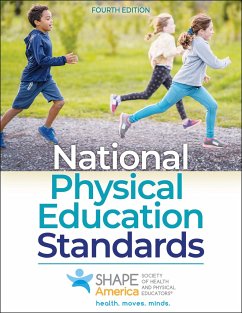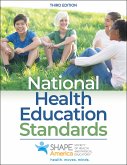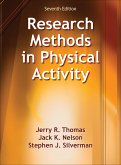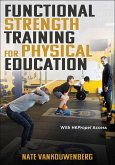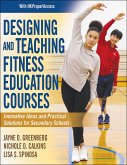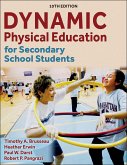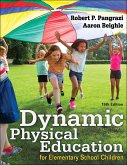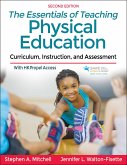SHAPE America - Society of Health and Physical Educators
National Physical Education Standards
SHAPE America - Society of Health and Physical Educators
National Physical Education Standards
- Broschiertes Buch
- Merkliste
- Auf die Merkliste
- Bewerten Bewerten
- Teilen
- Produkt teilen
- Produkterinnerung
- Produkterinnerung
The fourth edition of National Physical Education Standards includes new Grade-Span Learning Indicators and Learning Progressions, with a focus on the whole person and their physical literacy journey.
Andere Kunden interessierten sich auch für
![National Health Education Standards National Health Education Standards]() SHAPE America - Society of Health and Physical EducatorsNational Health Education Standards49,99 €
SHAPE America - Society of Health and Physical EducatorsNational Health Education Standards49,99 €![Research Methods in Physical Activity Research Methods in Physical Activity]() Jerry R. ThomasResearch Methods in Physical Activity114,99 €
Jerry R. ThomasResearch Methods in Physical Activity114,99 €![Functional Strength Training for Physical Education Functional Strength Training for Physical Education]() Nate VanKouwenbergFunctional Strength Training for Physical Education49,99 €
Nate VanKouwenbergFunctional Strength Training for Physical Education49,99 €![Designing and Teaching Fitness Education Courses Designing and Teaching Fitness Education Courses]() Jayne D. GreenbergDesigning and Teaching Fitness Education Courses76,99 €
Jayne D. GreenbergDesigning and Teaching Fitness Education Courses76,99 €![Dynamic Physical Education for Secondary School Students Dynamic Physical Education for Secondary School Students]() Brusseau, Timothy A., Jr.Dynamic Physical Education for Secondary School Students145,99 €
Brusseau, Timothy A., Jr.Dynamic Physical Education for Secondary School Students145,99 €![Dynamic Physical Education for Elementary School Children Dynamic Physical Education for Elementary School Children]() Aaron BeighleDynamic Physical Education for Elementary School Children161,99 €
Aaron BeighleDynamic Physical Education for Elementary School Children161,99 €![The Essentials of Teaching Physical Education The Essentials of Teaching Physical Education]() Stephen A. MitchellThe Essentials of Teaching Physical Education100,99 €
Stephen A. MitchellThe Essentials of Teaching Physical Education100,99 €-
-
-
The fourth edition of National Physical Education Standards includes new Grade-Span Learning Indicators and Learning Progressions, with a focus on the whole person and their physical literacy journey.
Produktdetails
- Produktdetails
- Verlag: Human Kinetics Publishers
- Fourth Edition
- Seitenzahl: 200
- Erscheinungstermin: 20. August 2024
- Englisch
- Abmessung: 278mm x 216mm x 12mm
- Gewicht: 656g
- ISBN-13: 9781718230835
- ISBN-10: 1718230834
- Artikelnr.: 70201738
- Herstellerkennzeichnung
- Libri GmbH
- Europaallee 1
- 36244 Bad Hersfeld
- gpsr@libri.de
- Verlag: Human Kinetics Publishers
- Fourth Edition
- Seitenzahl: 200
- Erscheinungstermin: 20. August 2024
- Englisch
- Abmessung: 278mm x 216mm x 12mm
- Gewicht: 656g
- ISBN-13: 9781718230835
- ISBN-10: 1718230834
- Artikelnr.: 70201738
- Herstellerkennzeichnung
- Libri GmbH
- Europaallee 1
- 36244 Bad Hersfeld
- gpsr@libri.de
SHAPE America – Society of Health and Physical Educators is the largest organization of health and physical educators in the country, serving as the voice for more than 200,000 professionals across the United States. The organization’s community includes a diverse membership of health and physical educators, as well as advocates, supporters, and over 50 state affiliate organizations. Since its founding in 1885, the organization has defined excellence in physical education. For decades, SHAPE America’s National Physical Education Standards have served as the foundation for well-designed physical education programs across the country. Additionally, the organization helped develop the National Health Education Standards and now owns this set of standards. About the Contributors Cory Dixon, PhD, is an assistant professor in the department of content area teacher education. His current research foci are centered on the educator preparation of physical education students at predominantly white institutions (PWIs) and the racialized experiences of students and faculty of color in higher education. He seeks to advocate for equitable educational opportunities for all by critically examining higher education, physical education pedagogy, and teacher preparation, in addition to better understanding the recruitment, retention, and experiences of faculty and students of color in higher education. Dixon’s research has been presented and published at various national and international conferences and in leading academic journals. Dixon earned his PhD and MEd in kinesiology and physical education teacher education from Auburn University. He holds a bachelor’s degree in kinesiology, sports studies, and physical education from Morehouse College, a historically Black college in Atlanta, Georgia. Suzanna Dillon, PhD, CAPE, is a professor of kinesiology at Texas Woman's University (TWU). Dillon has over 20 years of experience in teaching, researching, and mentoring in the fields of physical education, adapted physical education, adapted physical activity, and special education. At both TWU and Wayne State University, she has been awarded U.S. Department of Education grants, through which she conducts interdisciplinary personnel preparation and collaborative physical activity interventions for children and young adults with disabilities. Dillon is passionate about preparing future educators and physical activity professionals so that they are prepared to deliver interdisciplinary services to people with disabilities and are skilled in advocating for equitable physical activity opportunities within their communities. Through her grants and service on various boards, committees, and professional associations, particularly the National Consortium for Physical Education for Individuals With Disabilities, she aims to leverage her years of experience and content expertise to advance the field of adapted physical activity and make an impact within her local community and beyond. Fran Cleland Donnelly, PED, is a professor emeritus of health and physical education within the College of Health Sciences at West Chester University (WCU) in West Chester, Pennsylvania. Cleland taught for 28 years at WCU, where she also served as assistant chair of the Health and Physical Education Teacher Certification Program. She earned her bachelor of science degree in health and physical education at Purdue University and her doctoral degree in motor development, child development, and adapted physical education at Indiana University in Bloomington, Indiana. Prior to her years at WCU, Cleland taught at the University of New Hampshire and East Stroudsburg University in Pennsylvania, after beginning her career as a K-12 health and physical education teacher. She has served at the state, district, and national levels, including as SHAPE PA president (2009) and SHAPE America president (2017-2018). She is the lead author of Developmental Physical Education for All Children: Theory Into Practice. She has received numerous state, district, and national awards in recognition of her outstanding contributions to the profession, including the Elmer B. Cottrell Award from SHAPE PA, the Honor Award from SHAPE America, and the Tilia J. Fantasia Service Award from SHAPE America Eastern District. She was inducted into the North American Society of Health, Physical Education, Recreation, Sport and Dance Professionals by SHAPE America. In 2023, she was honored with the SHAPE America Hall of Fame Award.
Statement of Support From the American Federation of Teachers
Chapter 1. Introduction
The Standards Revision Process
Research in Motor Development Affecting Revisions
Use of the Standards in Developing Physical Education Curricula
Conclusion
Chapter 2. Reading the National Physical Education Standards, Grade-Span
Learning Indicators, and Learning Progressions
Reading the Grade-Span Learning Indicators
Implications for Teaching Using the Standards
Meaningful Physical Education
The Importance of Practice, Critical Elements, Feedback, and Demonstration
Conclusion
Chapter 3. PreK-2 National Physical Education Standards, Grade-Span
Learning Indicators, and Learning Progressions
Understanding the Learner
Developmental Characteristics Within the Psychomotor Domain of Learning
National Standards, Grade-Span Learning Indicators, and Task Progressions
Developmental Characteristics Within the Cognitive Domain of Learning
Developmental Characteristics Within the Social Domain of Learning
Developmental Characteristics Within the Affective Domain of Learning
Conclusion
Chapter 4. Grades 3-5 National Physical Education Standards, Grade-Span
Learning Indicators, and Learning Progressions
Understanding the Learner
Developmental Characteristics Within the Psychomotor Domain of Learning
Developmental Characteristics Within the Cognitive Domain of Learning
Developmental Characteristics Within the Social Domain of Learning
Developmental Characteristics Within the Affective Domain of Learning
Conclusion
Chapter 5. Grades 6-8 National Physical Education Standards, Grade-Span
Learning Indicators, and Learning Progressions
Understanding the Learner
Developmental Characteristics Within the Psychomotor Domain of Learning
Developmental Characteristics Within the Cognitive Domain of Learning
Developmental Characteristics Within the Social Domain of Learning
Developmental Characteristics Within the Affective Domain of Learning
Conclusion
Chapter 6. Grades 9-12 National Physical Education Standards, Grade-Span
Learning Indicators, and Learning Progressions
Understanding the Learner
Developmental Characteristics Within the Psychomotor Domain of Learning
Developmental Characteristics Within the Cognitive Domain of Learning
Developmental Characteristics Within the Social Domain of Learning
Developmental Characteristics Within the Affective Domain of Learning
Conclusion
Chapter 7. The National Physical Education Standards, Grade-Span Learning
Indicators, and Learning Progressions
Standard 1
Standard 2
Standard 3
Standard 4
Conclusion
Chapter 1. Introduction
The Standards Revision Process
Research in Motor Development Affecting Revisions
Use of the Standards in Developing Physical Education Curricula
Conclusion
Chapter 2. Reading the National Physical Education Standards, Grade-Span
Learning Indicators, and Learning Progressions
Reading the Grade-Span Learning Indicators
Implications for Teaching Using the Standards
Meaningful Physical Education
The Importance of Practice, Critical Elements, Feedback, and Demonstration
Conclusion
Chapter 3. PreK-2 National Physical Education Standards, Grade-Span
Learning Indicators, and Learning Progressions
Understanding the Learner
Developmental Characteristics Within the Psychomotor Domain of Learning
National Standards, Grade-Span Learning Indicators, and Task Progressions
Developmental Characteristics Within the Cognitive Domain of Learning
Developmental Characteristics Within the Social Domain of Learning
Developmental Characteristics Within the Affective Domain of Learning
Conclusion
Chapter 4. Grades 3-5 National Physical Education Standards, Grade-Span
Learning Indicators, and Learning Progressions
Understanding the Learner
Developmental Characteristics Within the Psychomotor Domain of Learning
Developmental Characteristics Within the Cognitive Domain of Learning
Developmental Characteristics Within the Social Domain of Learning
Developmental Characteristics Within the Affective Domain of Learning
Conclusion
Chapter 5. Grades 6-8 National Physical Education Standards, Grade-Span
Learning Indicators, and Learning Progressions
Understanding the Learner
Developmental Characteristics Within the Psychomotor Domain of Learning
Developmental Characteristics Within the Cognitive Domain of Learning
Developmental Characteristics Within the Social Domain of Learning
Developmental Characteristics Within the Affective Domain of Learning
Conclusion
Chapter 6. Grades 9-12 National Physical Education Standards, Grade-Span
Learning Indicators, and Learning Progressions
Understanding the Learner
Developmental Characteristics Within the Psychomotor Domain of Learning
Developmental Characteristics Within the Cognitive Domain of Learning
Developmental Characteristics Within the Social Domain of Learning
Developmental Characteristics Within the Affective Domain of Learning
Conclusion
Chapter 7. The National Physical Education Standards, Grade-Span Learning
Indicators, and Learning Progressions
Standard 1
Standard 2
Standard 3
Standard 4
Conclusion
Statement of Support From the American Federation of Teachers
Chapter 1. Introduction
The Standards Revision Process
Research in Motor Development Affecting Revisions
Use of the Standards in Developing Physical Education Curricula
Conclusion
Chapter 2. Reading the National Physical Education Standards, Grade-Span
Learning Indicators, and Learning Progressions
Reading the Grade-Span Learning Indicators
Implications for Teaching Using the Standards
Meaningful Physical Education
The Importance of Practice, Critical Elements, Feedback, and Demonstration
Conclusion
Chapter 3. PreK-2 National Physical Education Standards, Grade-Span
Learning Indicators, and Learning Progressions
Understanding the Learner
Developmental Characteristics Within the Psychomotor Domain of Learning
National Standards, Grade-Span Learning Indicators, and Task Progressions
Developmental Characteristics Within the Cognitive Domain of Learning
Developmental Characteristics Within the Social Domain of Learning
Developmental Characteristics Within the Affective Domain of Learning
Conclusion
Chapter 4. Grades 3-5 National Physical Education Standards, Grade-Span
Learning Indicators, and Learning Progressions
Understanding the Learner
Developmental Characteristics Within the Psychomotor Domain of Learning
Developmental Characteristics Within the Cognitive Domain of Learning
Developmental Characteristics Within the Social Domain of Learning
Developmental Characteristics Within the Affective Domain of Learning
Conclusion
Chapter 5. Grades 6-8 National Physical Education Standards, Grade-Span
Learning Indicators, and Learning Progressions
Understanding the Learner
Developmental Characteristics Within the Psychomotor Domain of Learning
Developmental Characteristics Within the Cognitive Domain of Learning
Developmental Characteristics Within the Social Domain of Learning
Developmental Characteristics Within the Affective Domain of Learning
Conclusion
Chapter 6. Grades 9-12 National Physical Education Standards, Grade-Span
Learning Indicators, and Learning Progressions
Understanding the Learner
Developmental Characteristics Within the Psychomotor Domain of Learning
Developmental Characteristics Within the Cognitive Domain of Learning
Developmental Characteristics Within the Social Domain of Learning
Developmental Characteristics Within the Affective Domain of Learning
Conclusion
Chapter 7. The National Physical Education Standards, Grade-Span Learning
Indicators, and Learning Progressions
Standard 1
Standard 2
Standard 3
Standard 4
Conclusion
Chapter 1. Introduction
The Standards Revision Process
Research in Motor Development Affecting Revisions
Use of the Standards in Developing Physical Education Curricula
Conclusion
Chapter 2. Reading the National Physical Education Standards, Grade-Span
Learning Indicators, and Learning Progressions
Reading the Grade-Span Learning Indicators
Implications for Teaching Using the Standards
Meaningful Physical Education
The Importance of Practice, Critical Elements, Feedback, and Demonstration
Conclusion
Chapter 3. PreK-2 National Physical Education Standards, Grade-Span
Learning Indicators, and Learning Progressions
Understanding the Learner
Developmental Characteristics Within the Psychomotor Domain of Learning
National Standards, Grade-Span Learning Indicators, and Task Progressions
Developmental Characteristics Within the Cognitive Domain of Learning
Developmental Characteristics Within the Social Domain of Learning
Developmental Characteristics Within the Affective Domain of Learning
Conclusion
Chapter 4. Grades 3-5 National Physical Education Standards, Grade-Span
Learning Indicators, and Learning Progressions
Understanding the Learner
Developmental Characteristics Within the Psychomotor Domain of Learning
Developmental Characteristics Within the Cognitive Domain of Learning
Developmental Characteristics Within the Social Domain of Learning
Developmental Characteristics Within the Affective Domain of Learning
Conclusion
Chapter 5. Grades 6-8 National Physical Education Standards, Grade-Span
Learning Indicators, and Learning Progressions
Understanding the Learner
Developmental Characteristics Within the Psychomotor Domain of Learning
Developmental Characteristics Within the Cognitive Domain of Learning
Developmental Characteristics Within the Social Domain of Learning
Developmental Characteristics Within the Affective Domain of Learning
Conclusion
Chapter 6. Grades 9-12 National Physical Education Standards, Grade-Span
Learning Indicators, and Learning Progressions
Understanding the Learner
Developmental Characteristics Within the Psychomotor Domain of Learning
Developmental Characteristics Within the Cognitive Domain of Learning
Developmental Characteristics Within the Social Domain of Learning
Developmental Characteristics Within the Affective Domain of Learning
Conclusion
Chapter 7. The National Physical Education Standards, Grade-Span Learning
Indicators, and Learning Progressions
Standard 1
Standard 2
Standard 3
Standard 4
Conclusion

